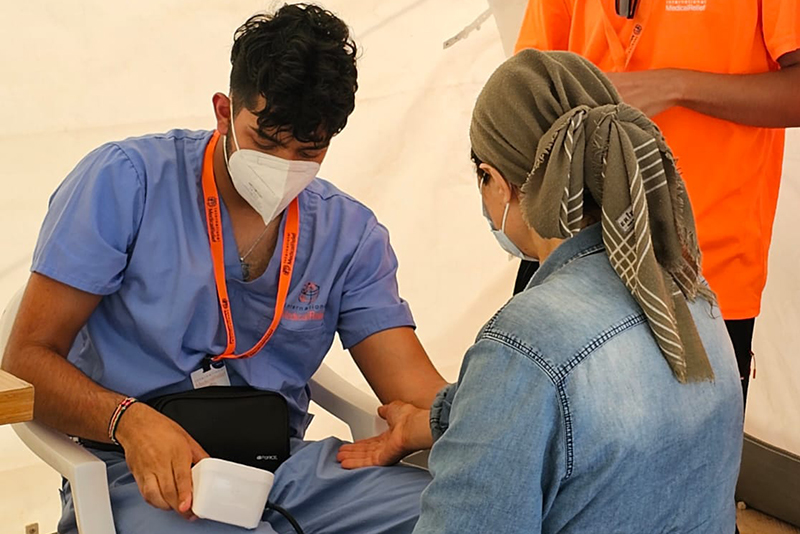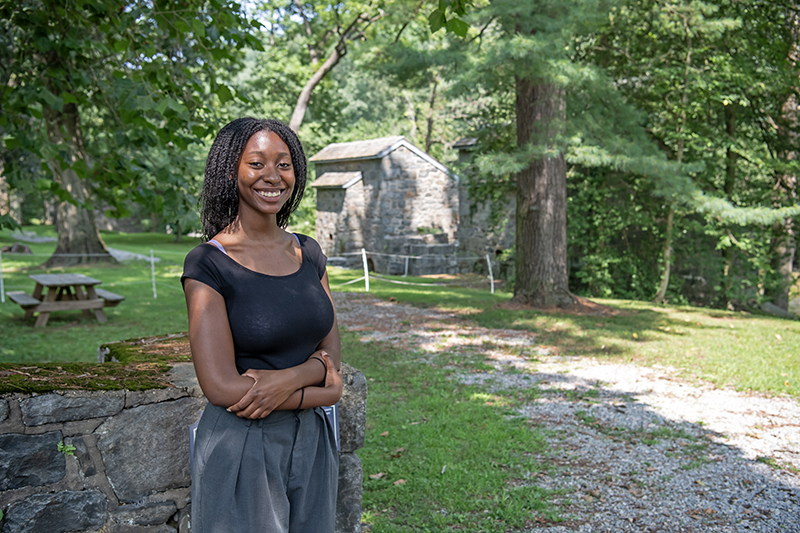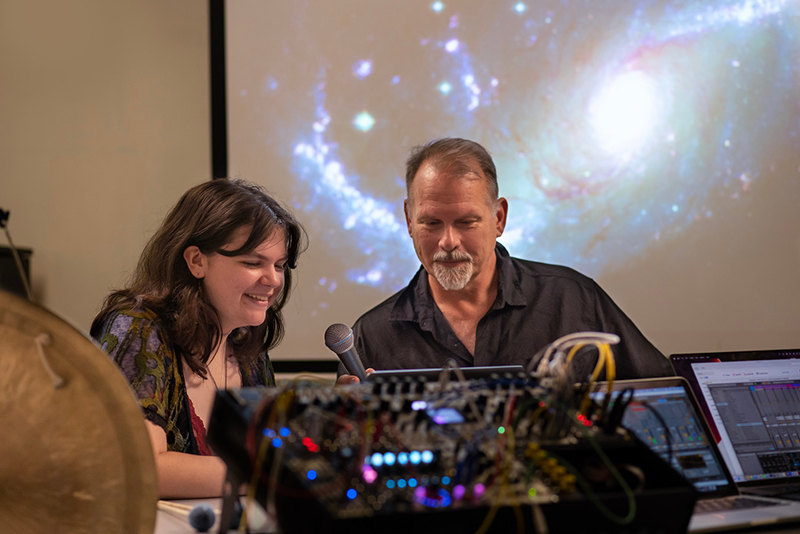Supporting Summer Experiential Learning
Washington College invests hundreds of thousands of dollars in supporting students undertaking internships, conducting research, or engaging in creative scholarship every summer, extending their liberal arts education into fields they may pursue after graduation.

Jay Dadhania '24 checks a patient during his work with International Medical Relief in Turkey.
Most college campuses take on a quieter mood and slower pace over the summer, but at Washington, that appearance is deceiving.
The College provides financial and other support for a variety of hands-on learning experiences for more than 15% of its students over the summer, making the season a vital part of a Washington education.
Summer is when students take internships in fields that interest them or dig into an academic or creative topic through in-depth collaborations with faculty and staff. It sees students making real contributions to the work of nonprofit organizations in Washington, D.C., Baltimore, Philadelphia and beyond. And it's the time of year when students can learn about a profession from practitioners, some on-campus and others at companies around the country.
In fact, some students are even working internationally, like pre-med student Jay Dadhania '24, who worked with the Turkey Disaster Relief mission of the nonprofit International Medical Relief to help people affected by the February earthquakes.
Spending summers during college taking internships or engaging in collaborative scholarship provides a valuable advantage to how students' post-graduation plans shape up, giving them a leg up in job interviews and graduate school applications. Recognizing this, the College helps to fund those experiences for students through a variety of funds, some dedicated to certain disciplines, some to specific internships, but all carefully coordinated by Washington faculty and staff to provide the best benefit to the greatest number of students possible.
“Washington College is highly supportive of student enrichment beyond the classroom,” said Aaron Lampman, dean of student success and achievement, who helps to administer and coordinate many of the grants funding students' summer experiential learning opportunities.
Internships of All Kinds
 Andraya Sudler '26 has been working as a communications intern at the Hagley Museum
in Wilmington, Delaware, through the Explore America Internship Program.The largest number of students receiving support over the summer are working at internships
that they found themselves, often with coaching from the Center for Career Development,
which together with the provost's office administers funds that help students with
travel costs, required supplies and supplementing internship salaries that are inadequate
for a region's cost of living.
Andraya Sudler '26 has been working as a communications intern at the Hagley Museum
in Wilmington, Delaware, through the Explore America Internship Program.The largest number of students receiving support over the summer are working at internships
that they found themselves, often with coaching from the Center for Career Development,
which together with the provost's office administers funds that help students with
travel costs, required supplies and supplementing internship salaries that are inadequate
for a region's cost of living.
"Internships are part of the fabric of the undergraduate experience. The only way we can ensure a level playing field is by providing funding,” said Nanette Cooley, executive director of the Center for Career Development. “Internships prepare students for their lives after Washington College. They allow them to gain practical, hands-on experience. It positions them for success.”
The funding from the career center and provost's office that is supporting external internships comes from a Hodson Trust gift, endowed so it can support Washington students every summer, making College support for experiential learning a permanent feature of an education here.
That funding enabled students to work this summer everywhere from the Defense Intelligence Agency to PNC Bank, from Clark's Elioak Farm in Ellicott City, Maryland, to NTM Engineering in Dillsburg, Pennsylvania.
An additional 28 internships this year are funded entirely by Washington College through the Explore America program run by the Washington College Starr Center for the Study of the American Experience. The students represent 16 different majors ranging from history and political science to human development, philosophy, and sociology.
The 10-week program places students at internships in nationally prominent organizations, which in 2023 include four Smithsonian museums, the Library of Congress, the National Constitution Center, the Human Rights Campaign, the National Park Service, the National Aquarium, and others.
“The skills, connections, and mentors these students gain through Explore America are an integral part of their Washington College liberal arts education and provides an incredible platform for their post-college lives,” said Adam Goodheart, director of the Starr Center. “The program lets students learn, through hands-on practice, how they can make a difference in the world. Whether helping to plan a major Smithsonian exhibition, creating a podcast, leading an educational program, or assisting with research that will inform public policy, these students are making an impact and serving the broader public.”
Students don't have to spend the summer away from Chestertown to make a difference while gaining valuable professional experience, though. Washington College also employs some interns directly. The Center for Career Development administers the Rebecca Corbin Loree Leadership & Internship Institute, which places students within College offices in their professional interests, such as the Miller Library, the Food Initiative, enrollment management, student affairs and others.
The Center for Environment and Society has seven students working on geographic information systems projects, such as handling, processing, and displaying large quantities of data regarding topics like vehicle thefts, crashes and stops made by Maryland police departments.
The Rose O'Neill Literary House has five interns this summer, plus another seven who joined for the Cherry Tree Young Writers' Conference in mid-July. The summer-long interns help with social media, graphic design, and general event preparation for both the conference and the Lit House's activities in the coming academic year.
Collaborative Scholarship
 Stevie Lyles '26 and music professor Ken Schweitzer compose music to represent images
from the James Webb Telescope projected behind them.While many Washington students are taking what they have learned in the classroom
into professional settings, others are using College support and the opportunity summer
presents to immerse themselves more deeply in an academic field.
Stevie Lyles '26 and music professor Ken Schweitzer compose music to represent images
from the James Webb Telescope projected behind them.While many Washington students are taking what they have learned in the classroom
into professional settings, others are using College support and the opportunity summer
presents to immerse themselves more deeply in an academic field.
Through two endowed funds, Washington College supports students in six- to 10-week collaborations with faculty in natural or social science research in the lab or in the field, artistic endeavors, and humanities scholarship. Regardless of the discipline, students identify a unique research question or creative project to focus on. Faculty provide mentorship in varying degrees, whether just helping to answer questions or working alongside the student as a full research partner.
The Hodson Collaborative Undergraduate Research Grants are supporting 10 students working on seven projects this summer. (A project to research how Washington students experience civic engagement has three students working together with two faculty members.) In areas ranging from music to feminist political ecology, these research projects have planned outcomes that include performance, curriculum changes, conference presentations and even journal publications.
Stevie Lyles '26 and Ken Schweitzer, associate professor of music, are collaborating in the creation of music and visuals aiming to connect people with images from the James Webb Space Telescope. While she has had Schweitzer for classes and individual lessons, Lyles said that the experience of creating art together has been a new way to work with him.
“He is my advisor, but through this project I've been able to kind of work alongside him and develop with him instead of under him. And that's really cool,” Lyles said. “It's a lot of open communication. If I don't like something, I have to be honest. If he doesn't like something, he'll be honest.”
Valerie Imbruce, director of the Washington College Center for Environment and Society, is working on a new research project with two students this summer through the Hodson Collaborative: Autumn Scully '24, an environmental studies major from Annapolis; and Lauren Albert '26, from Ellicott City. Imbruce sees benefits to the students in the wide variety of research methods they will undertake.
“Together, we will explore how the land that is now named the ‘River and Field Campus' is imbued with meaning though the names given to natural features of the land by the past two generations of people who have lived there, and how this meaning is codified by legal constructs like a conservation easement,” Imbruce said. “These students will learn to conduct research by reading easements and land deeds, contemporary and historical maps, and by talking to people and walking the land to make observations of the natural environment. This is an incredible opportunity to live in Chestertown over the summer and invest themselves in this place where they are spending their college years.”
The Toll Summer Research Program (funded by a Hodson Trust endowment for collaborative student-faculty research in the sciences) is also supporting 10 students this summer, with research projects in biology, chemistry, computer science, physics, and psychology. Some of these students are continuing research projects that have involved many students, faculty and staff over years, such as the field sparrow nesting survey, which is wrapping up one research question this summer after six years of effort. Others are examining novel topics that are expected to be completed this summer.
Hayley Covington '26 is a math and biochemistry double major from Houston, Texas, who is working on a project with Jeremy Bard, assistant professor of chemistry, through the Toll program. As an intern in Bard's lab, Covington has gone from having him as a lecturer and seeing him at office hours to working on research under his direction 9 to 5, Monday through Friday. Together, they are using synthetic chemistry to develop and prepare novel fluorescent molecules with an eventual goal of creating new dye molecules that could have potential applications in medical, agricultural, and environmental imaging.
Covington said the Toll research grant has helped her to hone skills she learned during the academic year by putting into practice techniques she learned in lab classes, and she added that she is learning about some topics this summer that will be useful in classes in her later years at Washington. The Toll funding itself, which pays for her housing, made it possible for her to dive into research the summer after her first year at the College.
“I knew I wanted to do research. Any kind of research enhances your education,” Covington said. “I plan to do research every summer. Next summer I plan to try to go somewhere else [by applying for a Research Experience for Undergraduates or similar program], which I'll be more competitive for after this.”